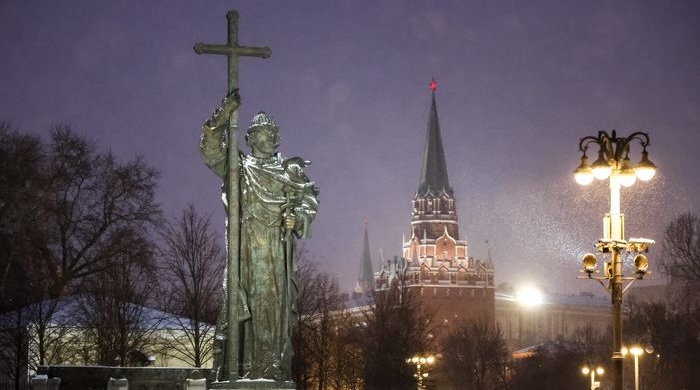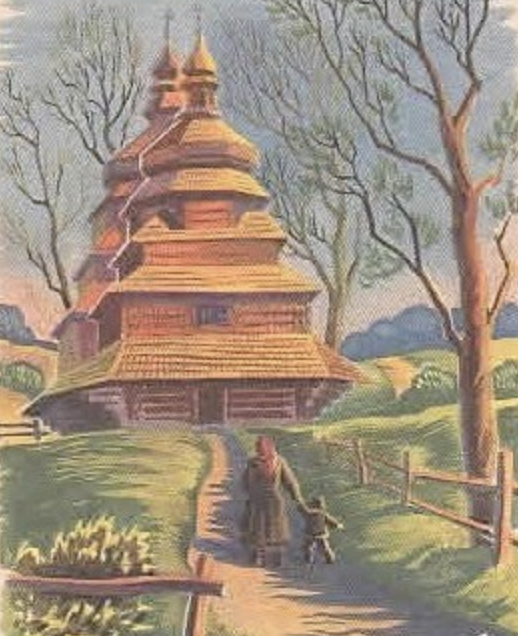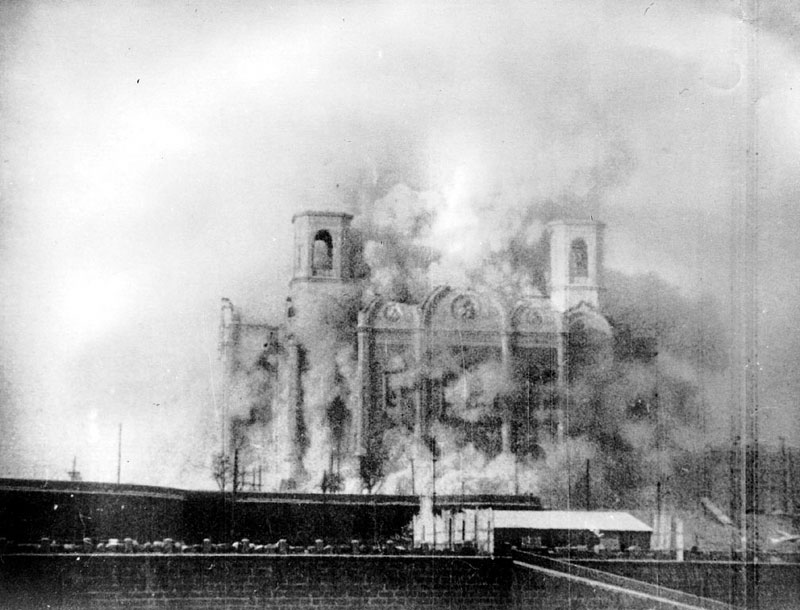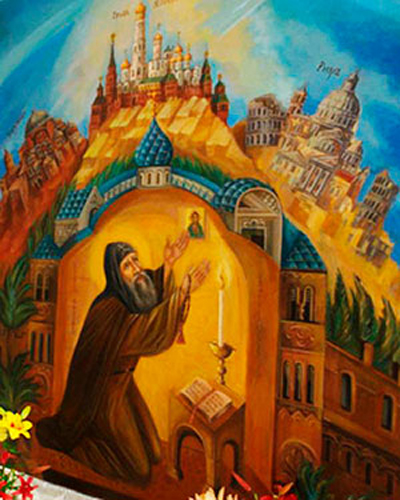
Luke 24:12-35 (Matins)
Galatians 1:11-19
John 10:1-9
Faithfulness
"The sheep will go out and find pasture."
(Jn 10:3)
In the Name of the Father and of the Son and of the Holy Ghost. Amen.
I am a teacher by trade,
a priest by vocation.
My job is to engage, to rouse, to provoke.
Last week I made a claim
—
namely, that the great Russian spiritual tradition (before the Bolshevik Revolution)
represents the high point of Christian development
—
hoping to draw a response.
As I have seen none among the thousands of readers we have,
perhaps I can move on to the next question:
"How did this happen?"
What has brought about
the great Russian spiritual tradition,
which is so venerated?
The development of even a religious house must begin through enlightenment
and
it must continue through organic wholeness.
All of those who share in it must long for God.
And they must become acceptable vessels for receiving the Holy Spirit
emptying themselves of all that is noxious to God and His holy angels.
One more thing:
their lives must be filled with love,
that only Divine property to be found on the earth.
They must attempt to requite the great love that God bears for them,
and
they must love each other, whom God loves so completely and so well.
Consider a monastery of many rooms.
Any one person has the power to deprive that entire house of holiness.
This is why silence is so important.
For it alone affords each person an atmosphere
to contemplate,
to commune with God in prayer,
and
to heal.
Perhaps we rarely think of it,
but the opposite of silence is egotism.
Silence is the outward sign of unity among mindful and prayerful souls
who respect and love one another.
As I say,
a spiritual house is hard-won,
a striving of several (or many) souls together.
How much more difficult is it for a diverse society to achieve
a devout character:
to bow before the Holy,
to share a sense of reverence,
and
to act on a common purpose for godliness and decency.
I suppose this
is something like a respectful silence observed on a large scale.
As with the founding of a spiritual community,
there must be one who first lights a holy candle,
who strikes the first sparks ignoring the pull of the world.
For Rus' that figure is Vladimir the Great (b. 963),
whose feast day we observe on this Sunday.
He stood before a cruel and vast pagan darkness
and
became a light unto the gentiles, so to speak.
He was instructed in the faith by his grandmother, Princess Olga of Kiev (b. 890),
but did not countenance it seriously.
Erecting statues to the Norse gods,
he spent the early years of his reign occupied in military campaigns.
At age seventeen he led armies into battle,
and
by 980 ruled over Kievan Rus'
consisting of the territories
now called Ukraine, Belarus, and Western Russia
having access to the Baltic Sea.

At length Vladimir wanted to unite his people not only under one sovereign
but
also
under one God.
He sent emissaries out to surrounding regions to assess their spiritual traditions
—
to the Muslims,
to the Jews,
to Latin Christians in the West,
and
to Constantinople,
the center and summit of civilization.
The envoys returned advising against
Islam, Judaism, and Latin Christianity.
But having visited the great Church of Hagia Sophia,
they reported,
|
We knew not whether we were in Heaven or on Earth .... We only know
that God dwells there among the people, and their service is fairer
than the ceremonies of other nations.
|
Prince Vladimir accepted their judgment
and
decided for Holy Orthodoxy,
and
with that Holy Rus' was born,
whose sacred homeland would be the
region of Ukraine
and
capital city, Kiev.
The Monastery of the Kievan Caves there
continues to be the holiest site of
Slavic Orthodoxy.
Achieving this unity was remarkable.
Yet,
looking over centuries ahead,
a similar achievement,
uniting all Holy Rus',
seemed plainly impossible.
Now, which geography on earth was less tractable?
The land mass alone was enormous
—
stretching over twelve
timezones
at the height of the Russian Empire, and later, the Soviet Union.
Today, it comprises 193 ethnicities who speak 270 languages and dialects.
And it encompasses multiple religions and sects
who enjoy an extraordinary degree of toleration.
Yet,
by 1914,
three years before the Bolshevik Revolution,
Russia had become overwhelmingly Orthodox:
55,173 churches;
29,593 chapels;
112,629 priests and deacons;
550 monasteries and 475 convents with a total of 95,259 monks and nuns.
To scale this,
the Roman Catholic Church in America today numbers 20,000 buildings
including administrative offices and schools.
How,
I ask you,
in so diverse a land as Russia,
could this unity be possible?
An important component was its organic unity.
From the Tsar unto the most remote peasant in the Taiga,
a shared devotion under the Kingdom of God knit every Orthodox heart to Heaven.
All kneeled before icons of the Mother of God making the sign of cross
—
the Tsar first of all.
Each family had their cherished icon corner where they might commune
with the angels and saints.
And hearts yearned for God on an unparalleled scale.
For where two or three are gathered in His Name,
He is always already
there among them.
☦
We could say that
the Russian Empire was called by God to receive a special blessing
—
to be the light and salvation of the World.
This concept has a name:
Third Rome.
Rome was the new Troy,
a mythic city on a hill
celebrated in our greatest literary works:
The Iliad,
The Odyssey,
The Aeneid.
And Troy's holy fire
would be set within the heart of the newly founded city-state:
Rome.
The relevant mythology
depicts Aeneas, offspring of Anchises and Greek goddess Aphrodite,
carrying a statue of Pallas Athena through the burning streets of Troy.
This statue
—
called the Palladium
(after Pallas, or "little maiden")
—
was
the Protectress of Troy
and
would now become the guarantor of Rome.
Centuries later
when Constantinople was appointed
the new capital of the Empire
(Second Rome),
the Palladium was transferred there.
From thence it disappeared and passed out of history
perhaps following the Sack of Rome by armies led by Pope Innocent III
in 1202.
As Athena was known as Parthenos, or "perpetual virgin"
(her temple was called the Parthenon),
so Eastern Christianity carried forward this tradition
bestowing the honorific Parthenos on individual female saints
of the Early Church.
This echoing song is heard
with the appearance of icons of Ever-Virgin Mary into Russia.
In particular, an icon in the Hodegetria style
was received from Constantinople during the thirteenth century to be known as
Our Lady of Kazan.
The icon's powers as a Palladium, or Protectress, were
attested by military commanders in several turning-point battles.
Today his Holiness Kirill,
Patriarch of Moscow and all Russia,
speaks in tones of a Third Rome ....
not in terms of conquest
but rather of faithfulness.
He speaks of "this island of freedom, the island of salvation"
which shines as a hope for mankind.

Now,
Americans today find this talk strange.
Island of freedom?
Isn't Russia all about oppression?
And isn't freedom of speech suppressed there?
But these are associations having to do with the Soviet Union.
It is true that Russia suffered under a cruel, totalitarian
government during most of the twentieth century.
And no one knew that truth more certainly than the Russian Orthodox Church.
The furious onslaught of
atheists
seized control of the government,
murdered the Tsar's family,
and
began a bloody campaign seeking to erase the Russian Orthodox Church from history.
In a two-year period alone (1937-1938),
168,300 Russian Orthodox clergy were arrested and over
100,000 shot according to records of the Moscow Patriarchate.
Many more were executed or sent to prison camps during the long,
bloody decades of Soviet oppression.
By contrast, during the Great Persecution of the third and fourth centuries,
between 3,000-3,500 Christian martyrs died.
That is,
the martyrs of Russia were 50 times
more numerous than those of
the Early Church.
Yes, the Russian Orthodox Church has seen the approach of atheists before.
She was steadfast before them one hundred years ago,
and
she stands steadfast before them today.
Today, the atheists have entered her traditional birthplace,
the environs around Kiev.
They have come with their rainbow flags and gay pride parades
and
elaborate plans for polluting children.
But why do I focus on Russia
when these ruinous forces have
nearly completed their conquest of American society.
I quote from an article last week from First Things
(perhaps the most respected Catholic journal is the U.S.):
Ours is an age of sexual insanity. Men compete in women's sports, male nurses
share dressing rooms with female nurses, and anyone who objects is a bigot.
Drag queens are children's entertainers, and cops watch nude men and women
stroll along the streets of San Francisco celebrating Pride Month. The leaders
of America's "pro-life" party can't be bothered to speak out against killing
unborn children, or risk upsetting party members in same-sex relationships by
defending marriage. When a massive report finds that "gender affirming care"
does more harm than good, American doctors blithely carry on, with the full
support of the current [Biden] administration. Our sexual ethic reduces to
a single prohibition: Thou shalt not suppress any sexual desire. How can
we free ourselves from this morass?
(Peter J. Leithart, "Restoring Sexual Sanity")
|
As the U.S. Army has officially labeled pro-life activists
"domestic terrorists,"
the reluctance to speak out is understandable.
And as I write this reflection, the Olympics in Paris
have opened with a drama at center stage:
drag queens mocking the Last Supper.
You see,
a frontal assault on Christianity is not merely incidental;
it is going to be the center-piece of the program ahead.
What does the Last Supper have to do with the Olympics?
The point is that the West has assembled
celebrating its values and principles.
And this imperative will be first among them:
Eradicate Christianity!.
The Bolshevik atheists sought to eradicate
the Russian Orthodox Church.
These atheists have set their sights on higher attainments:
eradication of Biblical Christianity on a global scale.
With the fall of the U.S. and Western Europe,
their achievement becomes plausible.
The Russian Orthodox Church knows the signs:
the persecution of religion,
the toppling of statues,
the attempt to erase cherished heritage,
and
the monomaniacal imposition of an extreme ideology on everyone and everything.

First and Second Rome
were the salvation of the world.
The Pax Romana gave the Empire universal peace,
just governance,
a judicial system that strived for fairness to every citizen,
and
a series of the engineering projects
that were the wonders of the world.
As the Russian Orthodox Church seeks to claim the mantle of Third Rome,
what does she propose to offer?
As a former Anglican and former Roman Catholic
who has spent his entire adult lifetime seeking the Church of God
and
as a diligent student who has devoted twenty-three years of university
and
seminary study to the same cause,
I venture an answer.
The Russian Orthodox Church,
and
her missionary arm,
the Russian Orthodox Church Outside Russia,
propose to offer faithfulness.
She will be the last Church to bow before the gods of our Western Culture ....
now, I said that wrong.
She will never bow.
And she will be there in the fullness of her spiritual strength and experience
when faithful humanity makes its last stand.
The extraordinary breadth and depth of Russian Orthodoxy
is not merely a legend from history
erased by Bolsheviks.
Today,
at the end of 2017,
the Moscow Patriarchate reported 36,678 churches in Russia alone.
And demand for more continues as she completes construction on three new churches
every day,
according to the Moscow Times in 2019.
She is coming into the fullness of an unprecedented witness to Christ.
And I can report back to you the devout character of these people,
for I have just returned from San Francisco,
where I spent virtually all my waking hours in three churches.
I saw whole families venerating the saints,
the children shining with a love of God.
I saw face after face radiating with the Holy Spirit
with tears running down from their eyes.
This was a level and scale of devotion I have not seen
in a lifetime spent in churches.
When he made his celebrated film, Ivan the Terrible in 1944,
Sergei Eisenstein
had its protagonist say at his coronation,
"Two Romes have fallen.
Moscow is the Third.
And there will be no fourth!"
Now,
Eisenstein had no way to know that eighty years later,
the
world would reach the brink of apocalypse.
Nuclear war is contemplated as the U.S. presses into
Russia's traditional sphere.
Scientists the world over agree that our planet has been
pushed in the direction of catastrophe, perhaps irrevocably.
Americans at home behold a level of moral degradation
that would have been unthinkable seventy years ago.
If the Lord should return tomorrow, truly, who would be surprised?
Meantime,
Russian Orthodox families have poured out their
life's blood
to combat
evil.
We have considered Russian Orthodox martyrdom which towers far above the
Great Age of Christian martyrs.
But I wonder how often we in America venerate her war dead,
men who died for us.
The United States lost 407,300 fighting men in World War II.
The Soviet Union lost 11,400,000.
They lost 28 times more lives than we did:
a whole generation,
the flower of their manhood,
touching every family.
This is sacred blood.
She will always struggle against evil.
It is in her nature.
When evil men seek to pollute the minds of children,
when they recruit young boys into their depravity,
when marriage is perverted,
when family is threatened,
when sacred life is discarded
and
the holy is desecrated .... she will not waver.
She has seen the monster atheism in its many guises.
For nearly a century she stared into its hideous face.
For gratuitous death is always the hallmark of atheism
—
more than 64 million unborn children from 1973 to 2022 in the U.S. alone.
And why not?
For human life in the materialist mind has no sacred or ultimate meaning.
It is therefore disposable.
And when she sees the stirring of atheists
once more appearing at her very gates,
she will not waver.
She will not compromise.
She will not negotiate.
She will not make concessions.
For evil by its very nature is one deception after another.
But she will bring her most powerful, even supernatural, weapon to bear:
she will practice her longtime faithfulness,
she will pray her beautiful and ancient prayers,
and
she will never bow .... except before Holy God.
Of equal power,
she has shown us what faithfulness looks like.
We who have been refugees
—
whose beloved churches have betrayed us,
whose clergy have mocked our devout intentions and have preyed upon our children,
who have defiled our holy spaces and have administered befouled sacraments
—
we at last have found
green pasture .... where sheep may safely graze
and
where our children may know decency.
Here we may be faithful without fear.
Here we may take our place among trusted men and women.
Here we may pour out our holy oblation
upon sacred ground,
never counting the cost.
Be ever faithful, my brothers and sisters.
It's all we have.
And
know that your fellows in this struggle
include holy champions of the faith
—
not only the Russian saints whose numbers are impossible to count,
but
also the martyrs and saints of history,
angels and archangels of Heaven,
yes,
and Almighty God, Who has staked everything on our faithfulness.
You know,
the Holy Scriptures do not tell the story of a faithful people.
They tell the bittersweet tale of a faithful God.
At long last
and
when everyone must count,
can we be faithful?
In the Name of the Father and of the Son and of the Holy Ghost. Amen.



